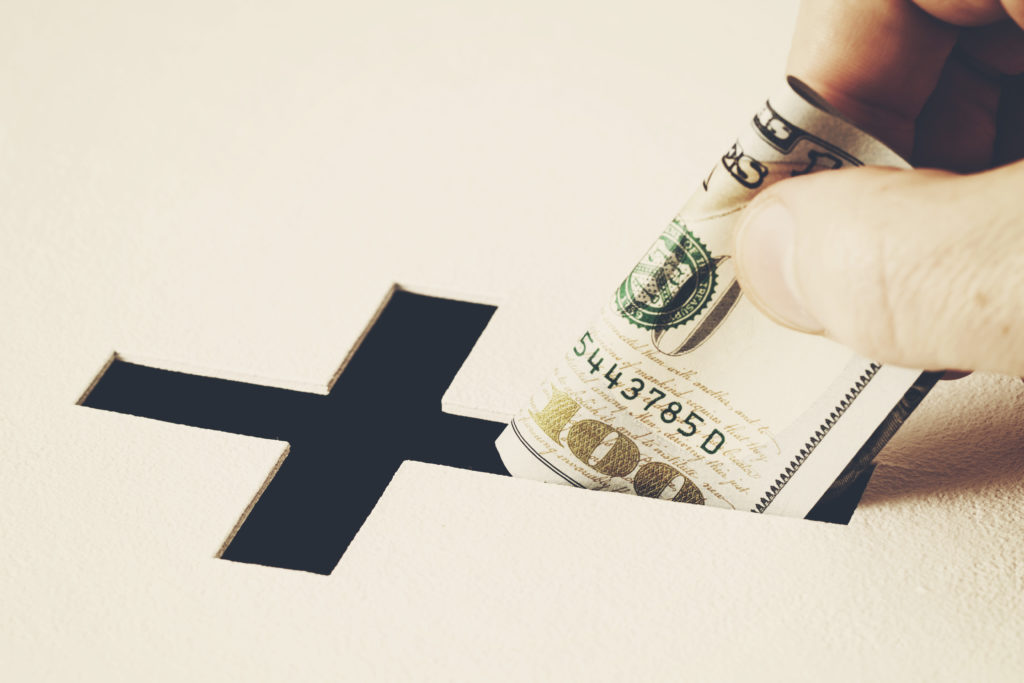Jesus said that love of money, not money itself, is the root of all evil.
Clearly, we can’t serve both God and mammon. We have to choose whether we’re accountable to God, or to the approval and security of the world.
Clearly we’re all called to be good stewards, to share what we have, not to squander money on vice, mindless forms of anesthesia, or extravagant consumer goods.
Just as clearly, we can’t wish money away, or do an end-run around it. One way or the other, we have a responsibility to respond to its presence in our lives.
St. Francis of Assisi was called to holy poverty, and poverty, like martyrdom, is perhaps a calling for a select few. Brother Joseph Labré, the 17th-century Franciscan tertiary who forswore family affluence and became a street beggar, is one example. Another is Sister Emmanuelle (Madeleine Cinquin), a French-Belgian nun known as the “rag-picker of Cairo.”
Others have tried to avoid money altogether by leaving civilization behind.
Christopher Knight, for example, disappeared into the Maine woods at 20 and stayed there, not talking to a soul, for 27 years. Michael Finkel tells the story in “The Stranger in the Woods: The Extraordinary Story of the Last True Hermit” (Knopf, $18.15).
But when push came to shove, Knight had to break into people’s summer cabins and steal food, books, batteries, and clothing, temporarily terrorizing the community.
“Into the Wild” (Anchor Books, $7.99), the 1996 best-seller by Jon Krakauer, tells of Chris McCandless, a young ascetic who gave his college money to Oxfam, hiked into the Alaskan wilderness with 10 pounds of rice and a rifle, and was found dead, most likely of starvation, having survived for 113 days.
John Cornwall’s “Earth to Earth: A True Story of the Lives and Violent Deaths of a Devon Farming Family” (Quercus Publishing, $30) is about two brothers and a sister in rural England who aimed to spend as little money as possible.
Even contemplative hermits live near a monastery, other people, a tabernacle.
But here, the older brother reasoned: “And if the worst came to the worst … one could simply operate a system of self-sufficiency: he had land, he had water, he had woods and orchards, he had a modest investment in stock. Well then, why not just shut the gate and survive till better days came?”
All social connection — because it meant spending money — was deemed “unproductive, wasteful, and dangerous.”
The siblings clung so tenaciously to the old ways, so pathologically hoarded every penny, became so averse to mingling with others, that they were found all three in a heap in their yard, shot to death. One of the brothers had killed the two siblings beside whom he’d lived and worked all his life, then turned the gun on himself.
Money can corrupt, in other words, but the effort to live without money can become its own false god.
“The Man Who Quit Money” (Riverhead Books, $15.90) by Mark Sundeen takes as its subject Daniel Suelo, born in 1961, who in the autumn of 2000, left his last $30 in a phone booth, moved to a cave in Moab, Utah, and made a conscious decision to avoid using money at all. Even bartering went against his give-freely, take-freely ethos.
He foraged food from dumpsters, picked nuts and berries, and sometimes did seasonal or volunteer charity-type work, but never in exchange for anything, even food or a bed.
He’s a likeable character. He thinks deeply about how to purify his thoughts and heart. He’s no hermit. A gregarious talker, he has close friends and loves to dance. People find their way to town to seek his counsel and guidance; he receives them graciously.
He quotes Jesus: Don’t worry about what you’re going to eat and drink. Store up your treasure in heaven. Regard the lilies of the field.
But to live in such a way that it’s OK for your benefactors to dirty their hands working, earning, paying taxes — but not you — carries at least a whiff of self-righteousness.
Suelo’s goal isn’t to cast his lot with the little guy, who toils at any job he can get to feed his kids and pay the taxes that support, for example, the local library where he maintains a blog and emails with his many followers.
His goal isn’t to share what he has, but to have nothing. There’s no way you could, say, raise a family with that ethos.
In fact, when Suelo quit the woods in 2016 to care for his ailing parents, he had to start using money.
The fact is we all have hypocrisies around money. Maybe money is an emblem of The Fall, which set us up to be perpetually at odds with our neighbor, perpetually suspicious, perpetually fearful.
Nonetheless, we could all try to be more like Christ who participated in the money system, but with an approach that was utterly carefree. Next time you need to pay the mortgage, why not call upon Peter — as Christ did when he needed to pay the temple tax (Matthew 17:27).
Tell him to go fetch a fish: there your needed money will be, right in its mouth.

